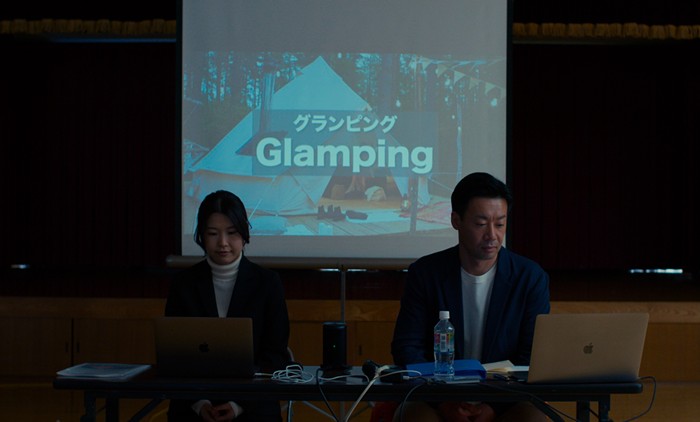Feature your business, services, products, events & news. Submit Website.
Breaking Top Featured Content:
Evil Does Not Exist Is About Glamping and Other Forces Beyond Our Control

by Dom Sinacola
At the center of Evil Does Not Exist—the latest narrative feature from Japanese writer-director Ryūsuke Hamaguchi (Drive My Car)—a town hall meeting unfolds. As is the nature of most town hall meetings, the intent is to gather feedback, in this case from the locals of Mizubiki village, a rural community just a few hours outside of Tokyo, regarding the new glamping site coming to their town. A pat video presentation clarifies that “glamping” is a portmanteau of “glamorous” and “camping.” The locals stare blankly at the screen.
Over the course of the 20-minute scene, villagers politely embarrass the two talent agents leading the meeting, Takahashi (Ryuji Kosaka) and Mayazumi (Ayaka Shibutani), by listing several red flags as to why the glamping plan, as it stands, won’t work: The septic tank isn’t big enough or in the right place. The site requires 24-hour supervision. The schedule isn’t feasible. While Mayazumi grows increasingly uncomfortable and apologetic, Takahashi placates each speaker bureaucratically. The company hears you. Thank you for your input.
Of course, the likelihood of the meeting is that the meeting hardly matters.

Mayazumi (Ayaka Shibutani) and Takahashi (Ryuji Kosaka) explain glamping. Courtesy of Janus
The budget for the glamping project is set and the schedule unchangeable, otherwise they’ll miss out on the cut-off date for pandemic-related government subsidies. Cinematographer Yoshio Kitagawa frames the room with mostly-static or slowly-drifting wide shots as the reality of the glamping project dawns on the villagers’ faces. They know no one’s really listening to their concerns. Though no one raises their voice, the town hall’s tension builds to a riveting pitch.
That tension, between what we can control and what we can’t, is sinew for a Hamaguchi film. Asako I & II (2019) or Wheel of Fortune and Fantasy (2021) are about elemental forces—the tides of time, talent, sex, love, death—and how characters are irrevocably shaped by them. 2021’s Drive My Car, the Oscar winning film for which most Americans might know the director, is a gutting take on one guy searching for life amidst unimaginable grief. Like water flowing over rock over centuries, or cigarette smoke flowing through a smoker’s bronchial tubes, whatever erodes Hamaguchi’s characters also shows us who they are.
Enter Takumi (Hitoshi Omika), Mizubiki village’s laconic naturalist, spring water enthusiast, and jack-of-all-trades. When we watch Takumi cut wood, carry water, smoke cigarettes, and forget to pick up his 8-year-old daughter Hana (Ryo Nishikawa) from school, we admire the silent man from a distance. We’re not quite voyeurs, we’re just enraptured by how he seems to slip into the rhythm of the forest around him. It can be a balm to sit and gawp at his routine.
A tracking shot of Takumi traipsing through the woods as he looks for Hana—she knew he’d forget to pick her up so she left school alone—bears a quiet sense of magic. He disappears behind a huge mound of earth only to emerge with his daughter riding piggyback. These are people in sync with their surroundings.
And Hamaguchi captures those surroundings with quiet wonder. A steaming dung heap shivers against the rising sun; our gaze floats under skeletal branches while Eiko Ishibashi’s lilting score strikes plaintive note after plaintive note. An image of a watering hole broken into a frozen pond is filmed with such crisp symmetry it must be startling to see on the big screen.
If anything, Evil Does Not Exist is a testament to Hamaguchi’s exquisite nature photography. The film breathes with hushed awe for the pastoral, as if the director has a personal responsibility to preserve these glimpses of smog-shrouded treelines and snow-capped vistas for future generations.
Still, Hamaguchi refuses to cast the glampers as villains. At the end of the town hall meeting, Takumi attempts to defuse the tension in the room by reminding everyone that the government didn’t open the area around Mizubiki village to settlement until after World War II. “It doesn’t have a long history,” he says. “In a way, all of us here are outsiders.”
By which he means: Proceed carefully. Even for Takumi, the wilderness still holds mysteries—a truth that carries Evil Does Not Exist to a devastating conclusion. It may just be Hamaguchi’s most upsetting ending yet, one that transforms the film’s ruminative, even hopeful tone into something knottier, bleaker. It may not be the clean conservationist message that would typically accompany such lovely shots of Mother Nature, but it is the sign of a filmmaker in complete control.
Evil Does Not Exist opens at Cinema 21, 616 NW 21st on Thurs May 9.
Continue Reading at PortlandMercury.com here
